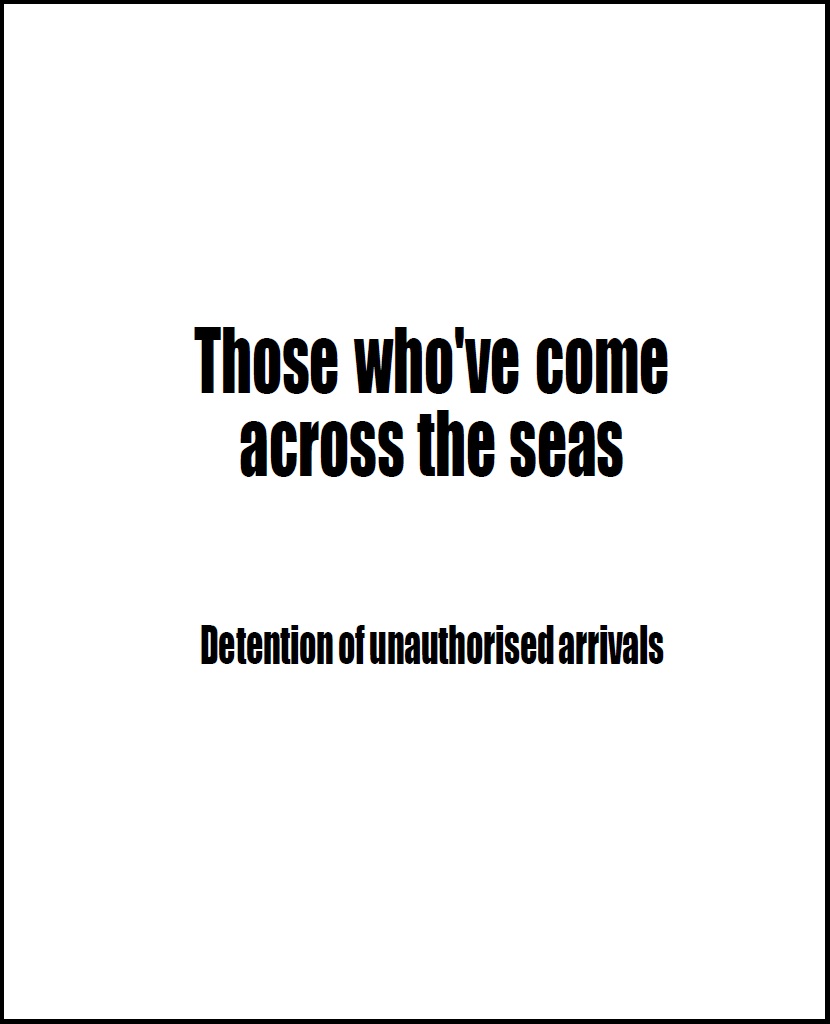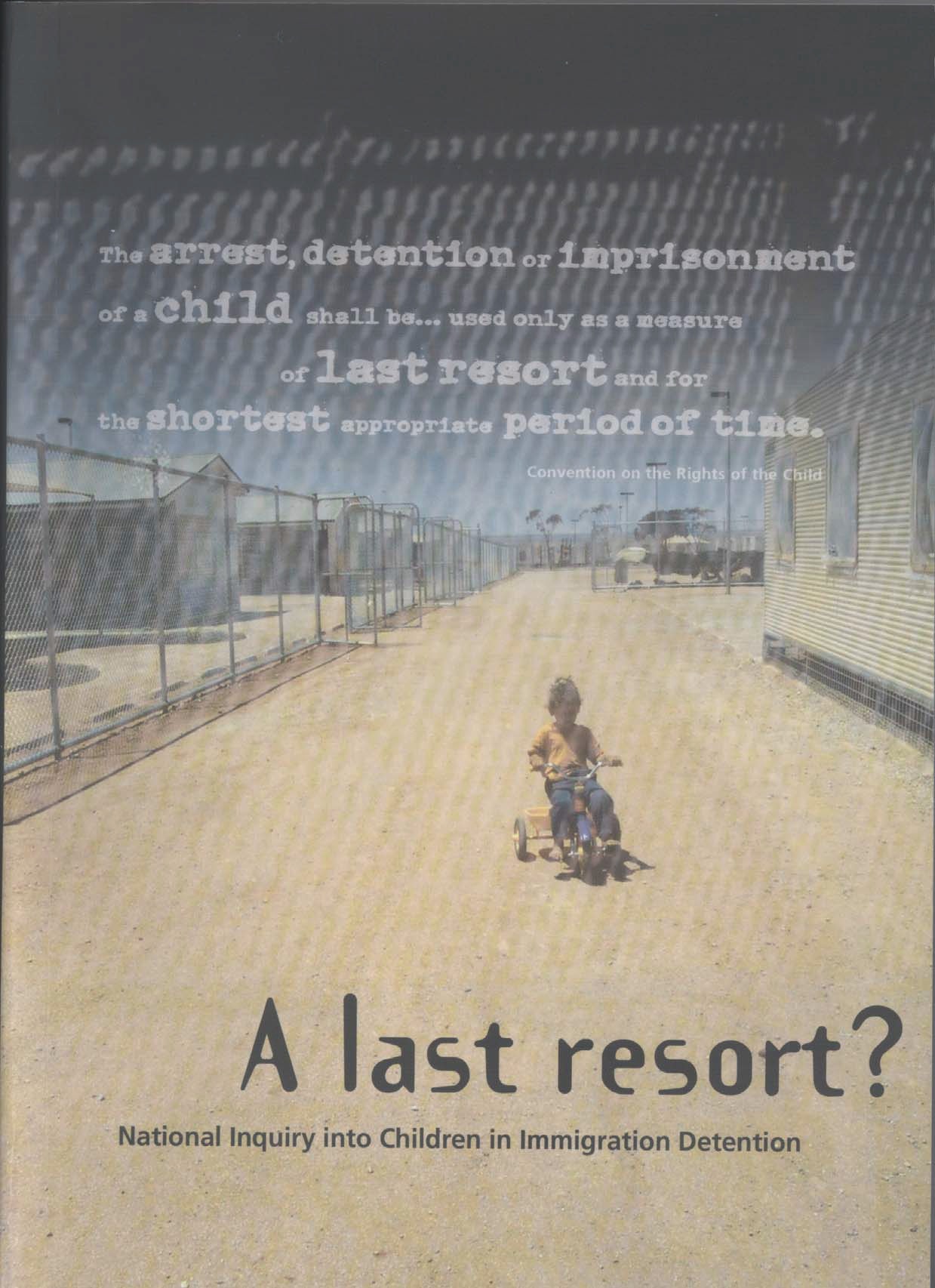The Commission's role
Asylum seekers, refugees and people in immigration detention
Over the last decade the Commission has worked to promote and protect the human rights of asylum seekers, refugees, and people in immigration detention. This work has included:
- investigating complaints about alleged breaches of human rights in immigration detention
- conducting visits to immigration detention facilities and publishing reports on those visits
- developing minimum standards for the protection of human rights in immigration detention, the Human rights standards for immigration detention
- conducting national inquiries concerning the treatment of people in immigration detention
- making submissions about proposed laws affecting asylum seekers, refugees and people in immigration detention
- commenting in the media about Commonwealth laws and policies relating to asylum seekers, refugees and people in immigration detention
- raising public awareness, for example through speeches, publications and educational materials
On this page:
-
What is the role of the Commission in investigating complaints about alleged breaches of human rights in immigration detention?
-
How does the Commission monitor conditions and treatment of people in immigration detention?
-
What does the Commission do to help increase community awareness about the human rights of asylum seekers, refugees and people in immigration detention?
What is the role of the Commission in investigating complaints about alleged breaches of human rights in immigration detention?
The Commission has statutory powers to investigate and resolve complaints about alleged breaches of human rights against the Commonwealth and its agencies, including complaints regarding immigration detention.
The Commission attempts to resolve complaints through a process known as conciliation. Complaints may be resolved by an apology, a change of policy or compensation.
If the complaint is not resolved or discontinued for some other reason, the President of the Commission will decide if there has been a breach of human rights. This might involve the President holding a public hearing where each side presents their version of events and answers questions. If the President is satisfied that a breach of human rights has occurred, the President will report the matter to the federal Attorney-General. In the report, the President can recommend compensation for any loss or injury a person has experienced. The report must be tabled in Parliament.
Past Commission reports have found breaches of human rights including:
• the right not to be subjected to arbitrary detention
• the right of persons deprived of their liberty to be treated with humanity and respect for the inherent dignity of the human person
• the right to be free from arbitrary interference with the family
• the right to have the best interests of the child treated as a primary consideration in all decisions regarding children
Click here to read Commission reports of complaints from people in immigration detention about breaches of human rights.
Click here for further information about the Commission’s complaint handling powers and procedures.
How does the Commission monitor conditions and treatment of people in immigration detention?
Visits to immigration detention facilities
The Commission conducts visits to Australia’s immigration detention facilities in order to monitor conditions in these facilities. The Commission’s aim is to ensure that conditions meet internationally accepted human rights standards.
While in immigration detention, people may have a variety of needs, including torture and trauma counselling, access to family tracing services, access to legal and migration advice, interpreting and translation, health and mental health care, and access to education and recreational activities.
The general procedure for a Commission visit to an immigration detention facility is as follows:
• Conduct a tour and general inspection of the detention facility.
• Interview DIAC management.
• Interview managers and staff of the detention service provider, Serco.
• Conduct separate interviews with health, mental health, recreation and kitchen staff.
• Meet with people in immigration detention who wish to speak to the Commission.
• Request documents relating to processes and systems in place to ensure the appropriate treatment of people in detention.
• Undertake relevant follow-up on issues of concern arising during the visit.
Reports of visits to immigration detention facilities
The Commission releases public reports outlining issues of concern arising from its visits to immigration detention facilities. Click here for a list of the Commission’s reports and photos from visits to immigration detention facilities from 1998 to the present day.
National inquiries
The Commission has conducted two national inquiries focusing on the conditions and treatment of people in immigration detention across Australia. The reports of these inquiries make recommendations to the Australian Government aimed at protecting the human rights of asylum seekers, refugees and others held in immigration detention. For further information, see:
What does the Commission do to help increase community awareness about the human rights of asylum seekers, refugees, and people in immigration detention?
The Commission aims to provide clear, factual information to increase community awareness and understanding of the situation of asylum seekers, refugees and people in immigration detention in Australia. In particular, the Commission aims to highlight the human rights issues involved in the treatment of these groups of people.
The Commission works to increase community awareness of these issues in a variety of ways. The Commission produces publications such as factsheets, background papers and Frequently Asked Questions such as Face the Facts: Questions and answers about asylum seekers and refugees (2012).
The President of the Commission delivers speeches and conducts media interviews to raise awareness about the Commission’s human rights concerns.
The Commission has also developed interactive web materials on a range of human rights issues, including those affecting asylum seekers, refugees and people in immigration detention. These include Something in Common and Tell Me Something I Don’t Know.
The Commission has also undertaken a range of community projects aimed at increasing social inclusion and countering discrimination. See The Commission’s work on race discrimination and cultural diversity issues, including the campaign Racism. It stops with me.
The Commission also promotes human rights education in Australian schools and other formal education settings. This includes promoting the rights of asylum seekers and refugees. The Commission is developing education resources which link human rights issues to the new Australian Curriculum.
The Commission has also developed human rights education resources for new arrivals in Australia and for young people enrolled in community language schools. These include:
• It’s your right! Enlish as a Second Language (ESL) resource (2009)
• Being Me Knowing You: human rights curriculum resource for 11-15 year olds enrolled in community language schools (2010)


